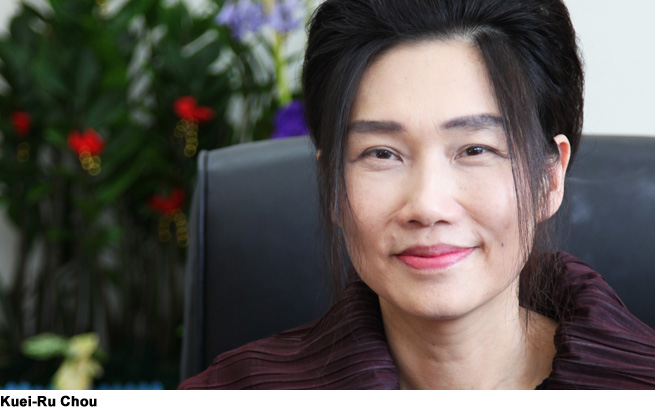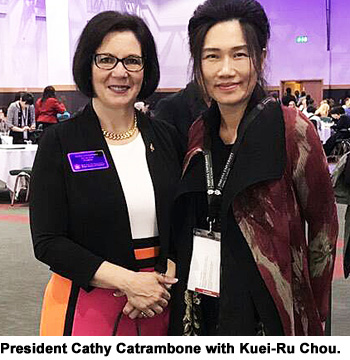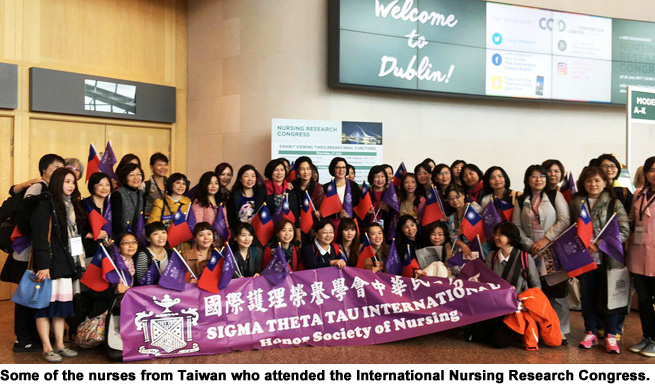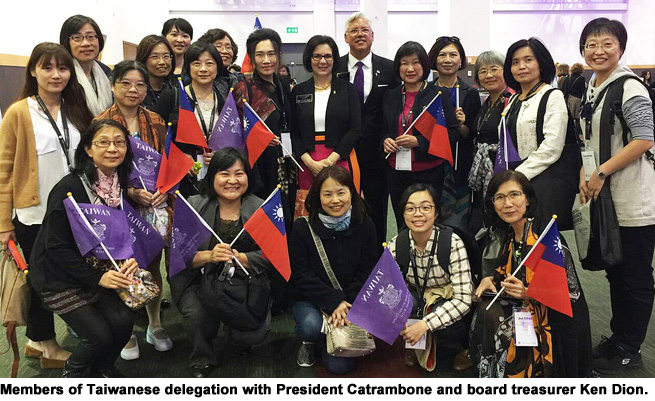101 nurses from Taiwan attend research congress in Dublin.
 A dean of nursing from Taiwan responds to questions from the editor of Reflections on Nursing Leadership about the importance of the International Nursing Research Congress.
A dean of nursing from Taiwan responds to questions from the editor of Reflections on Nursing Leadership about the importance of the International Nursing Research Congress.
 RNL:
RNL:
President Cathy Catrambone recently informed me that 101 nurses from Taiwan attended the International Nursing Research Congress in Dublin, Ireland, and that you played a key role in bringing that about. Tell me how it happened and why you felt it was so important for you and your colleagues in Taiwan to attend the congress.
Kuei-Ru Chou:
“Reach out to the world and gain international recognition for Taiwan nursing society.” This motto is deeply ingrained in the heart of every member of Lambda Beta-at-Large Chapter. As a team, we work hard to make the motto come to reality. Therefore, 101 nursing colleagues were brought in to attend this international congress in Dublin with the aim of highlighting Taiwan nursing.
 Four key points made this research congress a success for us:
Four key points made this research congress a success for us:
1) Building a collaborative team: Preparations for this congress started a year ago. We gathered nursing schools’ faculties and hospital nursing directors to actively participate in the preparation process.
2) Showcasing a variety of materials: Flags of Taiwan and Lambda Beta-at-Large Chapter were prepared. We also set up a variety of Taiwan demonstration materials, including the Taiwan logo, small golden medals, media, and flyers. Overall, the Taiwan logo stood out.
3) Effective and efficient communication: We announced all important events related to the congress on an instant communication app called LINE. This allowed our members to tune in for any news updates related to this congress. It also encouraged them to communicate with extraordinary international leaders, such as Annette Kennedy, president of the International Council of Nurses; STTI President Cathy Catrambone; and Kenneth Dion, a member of the STTI board of directors. This helped achieve people-to-people diplomacy.
4) Resource mobilization: National ministries—including the Ministry of Culture, Ministry of Tourism, and Ministry of Foreign Affairs—supplied us with resources such as display materials and a budget subsidy. The Taipei Representative Office in Ireland kindly assisted us by arranging meetings with important international leaders and promoting the visibility of Taiwan’s nursing profession.
When Kenneth Dion, STTI board treasurer, took a roll call of countries participating in the congress, we gathered our people together and, when Taiwan was announced, waved the national and chapter flags. This congress was a great opportunity to share our research findings and network with other professionals from all over the world. We presented dozens of research studies, which put Taiwan in the spotlight and proved that nursing research in Taiwan has made great contributions to healthcare.

We are actively participating in major international nursing organizations, communicating with international leaders, and improving the visibility of Taiwan’s nursing profession. The following quote by Henry Ford explains the reasons for our success: “Coming together is the beginning. Keeping together is progress. Working together is success.”
RNL:
You are a professor and dean of the College of Nursing at Taipei Medical University in Taiwan, a college that emphasizes research. How did you become interested in nursing research? Tell me about your personal research journey and why you are so committed to advancing nursing research in Taiwan.
Chou:
I have worked in both public and private institutions of higher education since 1988. During the intervening years, Taipei Medical University, Shuang-Ho Hospital, National Defense Medical Center, and Tri-Service General Hospital were all involved in my journey to gain specialty and professional knowledge. Over the years, I have implemented programs that integrate research in psychiatric and geriatric nursing, enabling me to develop an array of research programs and publish a series of research articles. I have more than 30 years of experience in leading research projects. In the future, I intend to continue devoting myself to advancing nursing education and collaborating with other professionals.
Because nursing is such a dynamic field of study and practice, I knew I could find a niche that would allow me to utilize my interest in science and the natural world as well as my desire to help people in need. Nursing and research work together, and optimal nursing care is dependent on implementing the latest research findings. Practices that have been proven effective through research allow nurses to better advocate for patients and provide the best possible care. Although the majority of nurses who provide patient care are consumers of nursing research, implementing evidence-based nursing practice is crucial to delivering optimal nursing care.
RNL:
It is clear from the website of the Taipei Medical University College of Nursing that you are committed to promoting implementation of research findings in nursing practice. Identify two or three keys you have found helpful in making the critical connection between nursing research and nursing practice. How does research congress help promote that connection?
Chou:
The aim of knowledge transformation is to provide a bridge for putting evidence-based practice into action. I have found the following helpful in making that critical connection between nursing research and nursing practice:
1) Setting up evidence-based communication platforms: Practitioners have difficulties in finding, assessing, interpreting, and applying current best evidence from systematic reviews. To help address these issues, we need to put a lot of effort into setting up communication platforms that can critically integrate appraisal studies and clinical nursing guidelines that apply in clinical settings. Providing quick access to accurate summaries of best evidence is the newest bridge that can be used to overcome this barrier.
In recent years, more nursing professionals have been actively engaged in clinical practice settings—conducting research, mentoring others in their research, and disseminating new knowledge. More clinical nurses than ever are engaging in research and applying evidence in the clinical setting. Not only does this enhance the professionalism of nursing, but it also results in improved patient, provider, and organizational outcomes.
2) Establishing policies within the university: Taipei Medical University established a center for management and development, engaging clinical and academic leaders from various disciplines within the university to work together. The center provides a platform for all faculties to exchange ideas and experiences, which improves nursing practice.
3) Promote joint university-hospital programs among nursing professionals: The Taiwan health system allows joint programs among nursing professionals who are attached to nursing schools and hospitals. Nurses working in clinical practice are allowed to join faculty teams and deliver courses in sister nursing schools that are clinically oriented. To help promote evidence-based care, nurses are also encouraged to assist students clinically. RNL
Kuei-Ru Chou, PhD, RN, is professor and dean of the Taipei Medical University College of Nursing in Taipei, Taiwan.